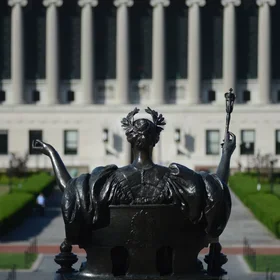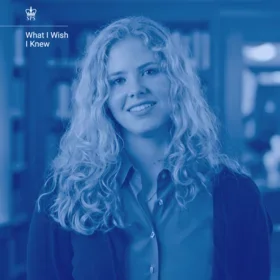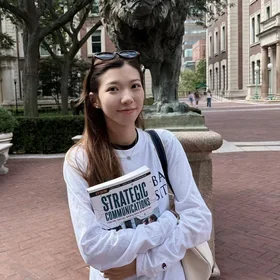When Michael McMahon was looking for an academic program to advance his career, he discovered that Columbia’s Master of Professional Studies (M.P.S.) in Wealth Management was the perfect fit. McMahon is a wholesaler for an alternative asset management firm and is currently enrolled in the 16-month online master’s program. McMahon shared his daily routine as a full-time professional, an Ivy League student, and a Wealth Management Representative in the Columbia SPS Student Government.
Tell us about your career.
I work for a company that provides private loans to private equity firms. It's my responsibility to get to know financial advisors from various firms and position our funds and strategies as a way for them to solve problems for their clients. Additionally, it's important for me to know about different areas including portfolio construction and capital markets and any other issues that advisors encounter like running a more efficient business, bringing in new investors, and developing holistic financial plans. If I can help them solve problems, the hope is they'll be more inclined to use our products.
Why did you decide to enroll in Columbia’s Wealth Management M.P.S. program?
I started looking for an advanced academic program because I wanted to be a more effective wholesaler and differentiate myself from my peers. An M.B.A. degree seemed too broad and certifications like a CFA or CIMA seemed too narrow. Prior to Columbia, I looked at a lot of different schools; this program felt tailor made for my needs. It’s helping me to better understand my clients' priorities and concerns. I'll use this knowledge to be a more thoughtful consultant with a more creative sales approach.
How do you balance your work with your studies?
Initially, it was hard to strike a balance between work, school, and personal interests. However, the asynchronous structure of the Wealth Management program makes things a lot easier. I can do a little work between meetings or watch this week's classes from an airport lounge. Pre-pandemic, both my wife and I traveled all the time for work. While I'm doing more Zoom meetings these days, we still try to head out of town for long weekends. I'm also a huge movie fan and try to make it to the Film Forum at least once a month.
Do you have any unique places from which you view the class lectures?
My classes can start whenever I have time. One of the best things about this program is the flexibility. I've watched the pre-recorded lecture videos and dialed into live office hours from all over; from my home, from my office, from JFK... even from the side of a pool on vacation!
How do you ensure that you’re getting the most out of the online program?
I get the most from my classes by taking what I've learned into the real world. I'm lucky to work with financial advisors every single day. It's great to call the ones I'm friendly with and ask what they think about a certain topic or what they would do in a particular situation we learned about in class.
This semester, I'm taking courses on Investments and Tax Planning. While I like to think my background in asset management has helped me add some value to the investment class, the tax coursework is completely new to me. So I'm really grateful that our program brings in people from different backgrounds–my classmate who spent years at a Big Four accounting firm has really helped me out with the tax material.
How has your learning from the program contributed to your career?
It is clear to me that the conversations I have with clients are much deeper since the program began. Around my own firm, I feel like my reputation has increased. I want to be a student of my industry and I think this program can really demonstrate that you're committed to learning and improving.
How do you work with professors and other students in your cohort?
In-person networking has been difficult during COVID-19 but all of my classmates–as well as those from the previous cohort–have been happy to hop on calls so we can get to know each other. The same thing goes for our professors. Now that things have reopened in New York City, a couple of us are planning to get together face-to-face. I'm excited to finally see everyone.
Do you have any advice for prospective students?
It may be a truism, but in this program you definitely get what you give. The more committed you are to the program, the more you'll learn. When it comes to discussion posts, add your real-life experiences and details. When you work on group projects, volunteer for the hard assignments. Getting a master's from Columbia can absolutely transform your career–be sure to treat it that way.
What does a day in the life of Michael McMahon look like?
Morning Routine
6:45 a.m.
I have just enough time to do a quick Peloton class and get ready to head out the door by 8:05 a.m.
8:30 a.m.
I work close enough to the office to walk and seated at my desk around this time.
9:30 a.m.
This is when the stock market opening bell rings, and my first meetings with clients normally start.

Lunchtime
Around noon, when my clients are having their lunch, I try to sneak in some studying.
Afternoon Routine
3:30 - 4:30 p.m.
Around this time, my clients are usually wrapping their trades for the day. So, I view the asynchronous lecture from anywhere.

Evening Routine
While we don’t have a fixed time on networking, I have found most students, alums, and professors, are open to connecting outside of working hours.
7:30 p.m.
Normally, I make it back home around this time. I usually cook with my wife, talk about our day, and hop back online. I use this time to do some readings or work on an essay.


